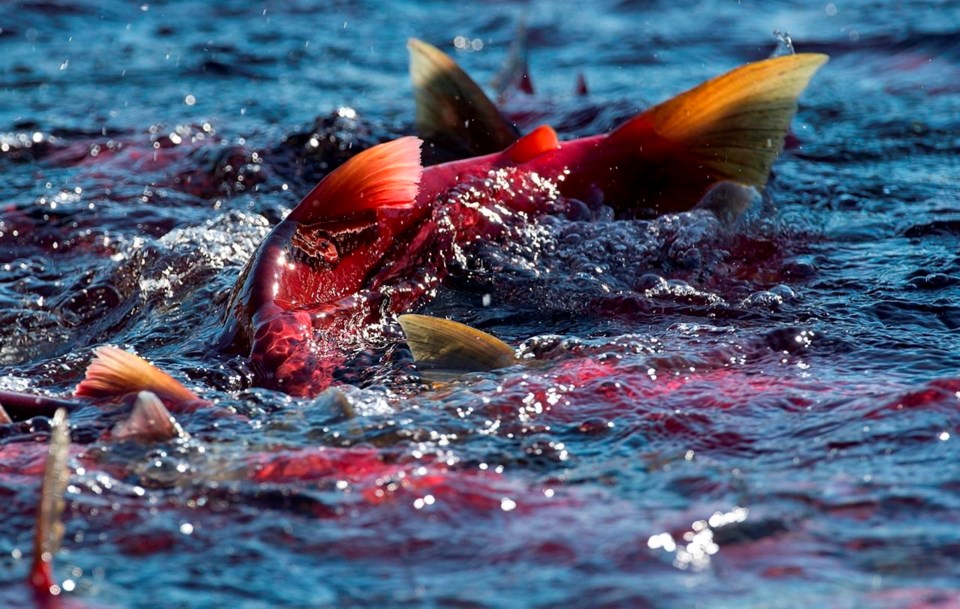VICTORIA — Pink salmon returns to British Columbia's Fraser River are exceeding original forecasts, prompting disagreements about whether the potentially bumper season has anything to do with the closure of open-net salmon farms off Vancouver Island.
The Pacific Salmon Commission said it is increasing its projections of Fraser River pink salmon returns this summer to a possible high of 11.6 million, up from an estimate of between 6.1 million and 8.6 million fish.
Some Indigenous leaders and environmentalists suggest there's a link between the increase and the recent closure of the open-net farms in the Discovery Islands.
But the B.C. Salmon Farmers Association, which represents the majority of the province's operators, rejected that suggestion, saying pink salmon numbers are also reportedly high in Alaska, Washington and the Atlantic Ocean.
"It's a great story about the pink salmon return to the Fraser as they are returning to all parts of the Pacific, and Norway and the U.K and Newfoundland," association spokesman Ian Roberts said Thursday.
"Somehow we have reduced this down to a local story that says this particular stock returned because salmon farms were closed."
Open-net fish farms off B.C.'s coast have been a major flashpoint, with environmental groups and some Indigenous nations saying the farms are linked to the transfer of disease to wild salmon, while the industry and some local politicians say thousands of jobs are threatened if operations are phased out.
The salmon commission, which was formed by the governments of Canada and the United States in 1985 to implement the Pacific Salmon Treaty, said on its website the increase is based on the numbers of pink salmon being caught in marine test fisheries in B.C. coastal waters.
"There's definitely a higher abundance of pink salmon than expected," Fiona Martens, chief of fisheries management programs at the Pacific Salmon Commission, said in an interview.
"The Fraser panel did increase the run size for Fraser pink salmon," she said.
Don Svanvik, a hereditary chief with the Namgis First Nation at Alert Bay, B.C., said pink numbers are at their highest in 20 years, other than in 2010 when huge numbers of pink and sockeye salmon returned to the Fraser River.
"I understand the pink numbers are the biggest ever recorded for the test fishery," he said. "The sheer numbers are astounding. I absolutely believe it's pointing towards the open-net fish farms."
Then-fisheries-minister Joyce Murray announced last February the federal government would not renew licences for 15 open-net Atlantic salmon farms around B.C.'s Discovery Islands, located near Campbell River.
The announcement came after the federal government announced in December 2020 it would phase out 19 Atlantic salmon farms in the Discovery Islands area as part of its plan to transition 79 B.C. salmon farms.
A consultation period involving Indigenous and non-Indigenous communities and leaders, environmental groups and industry representatives on the transition plans was extended until the end of this summer.
Svanvik said the pink salmon returning to the Fraser River this summer are the first runs that migrated past the closed Discovery Islands farms from the river where they were born to the Pacific Ocean and now back to the Fraser to spawn.
"Those pinks that went out, they didn't have fish farms in their path," he said.
Martens said the salmon commission could not comment on the potential connection between the closure of the fish farms and the increased pink salmon returns.
Murray said at the time that the decision not to renew the fish farm licences in the Discovery Islands was partly based on the area being a key route for wild salmon where narrow passages bring migrating juvenile salmon into close contact with the farms.
Murray said recent science indicates uncertainty over the risks posed by the farms to wild salmon, and the government is committed to developing a responsible plan to transition away from open-net farming in coastal B.C. waters.
Federal Fisheries Minister Diane Lebouthillier, appointed last month, was not immediately available for comment.
Her ministry referred comment to Fisheries and Oceans Canada, where an official said it was preparing to comment on the issue.
Environmentalist Alexandra Morton, who opposes open-net salmon farms in B.C. ocean waters, said she has been watching salmon for almost two decades in B.C. and this year's pinks are the healthiest she has seen.
"I've been looking at pink salmon migrating out of the Fraser since 2005, and when these fish went out to sea as juveniles in 2022 they looked better than any generation I have looked at since 2005," she said. "By that I mean they did not have sea lice. These fish are the first generation of pink salmon to go through completely clean, no salmon farms in the Discovery Islands."
Numerous studies have suggested sea lice from farmed salmon pose minimal risk to wild salmon.
Roberts said warming oceans in recent years have contributed to expanded pink salmon stocks and territories, which now include parts of the Atlantic.
"Pink salmon are booming all about the Pacific Ocean," he said. "This salmon's success has nothing to do with local influences and everything to do with global ocean conditions that now favour pink salmon."
This report by The Canadian Press was first published Aug. 17, 2023.
Dirk Meissner, The Canadian Press



